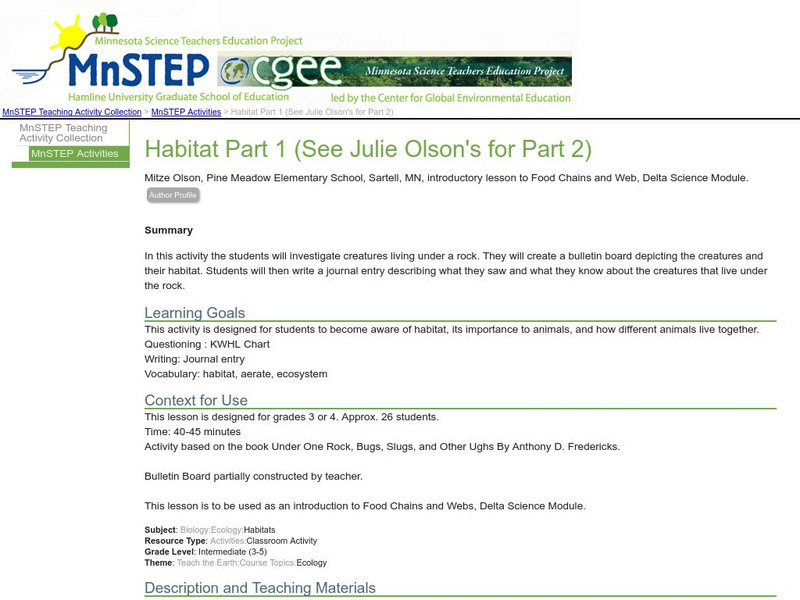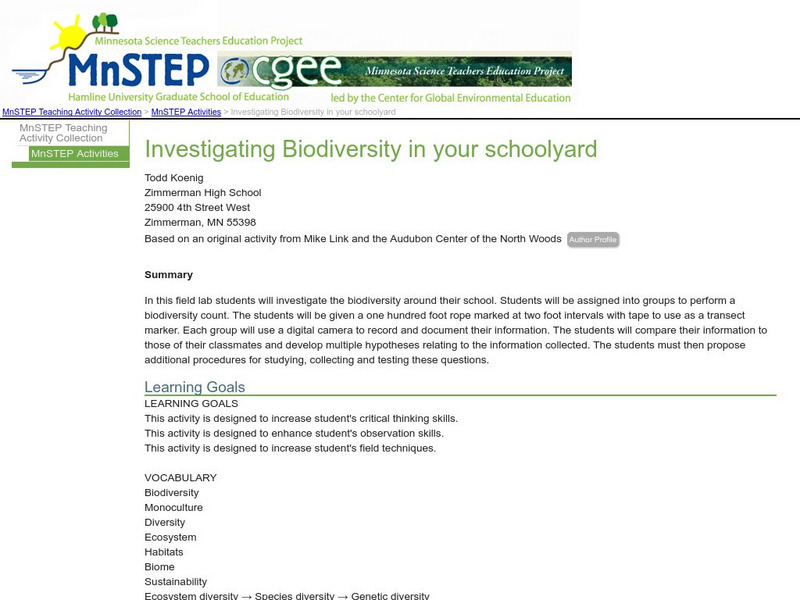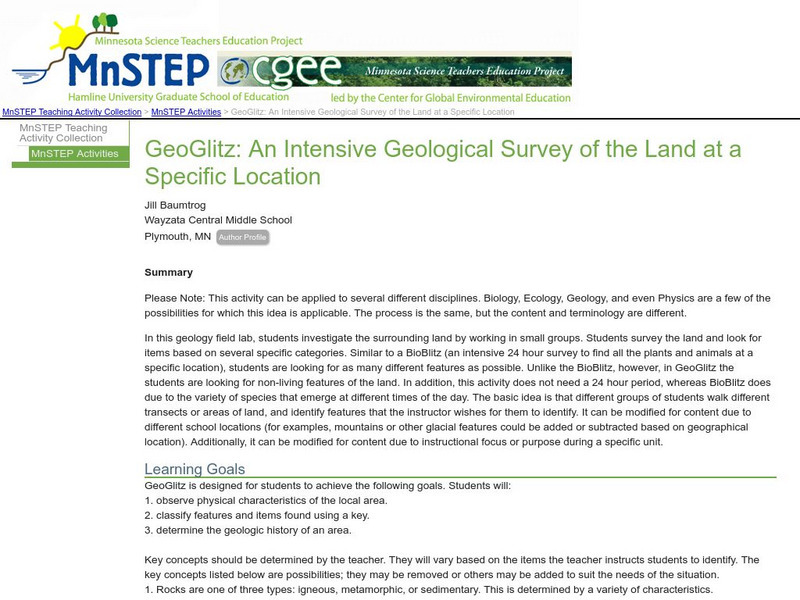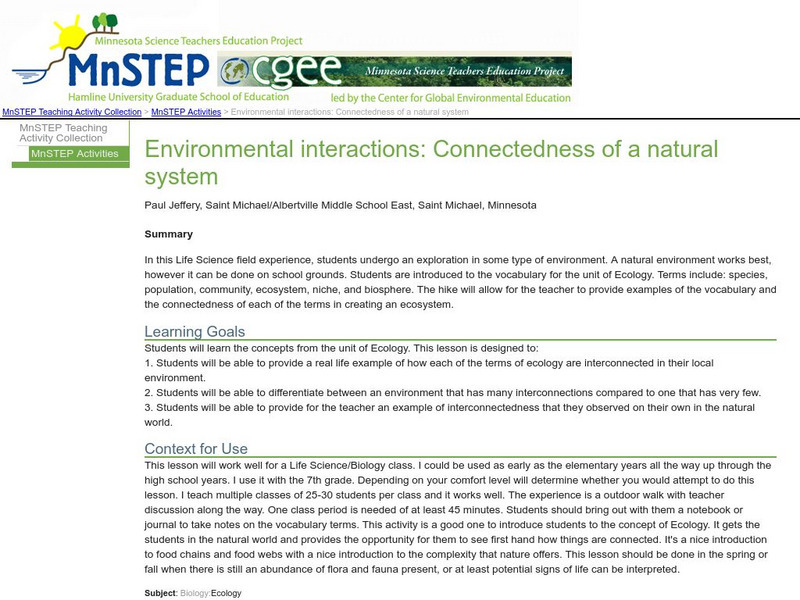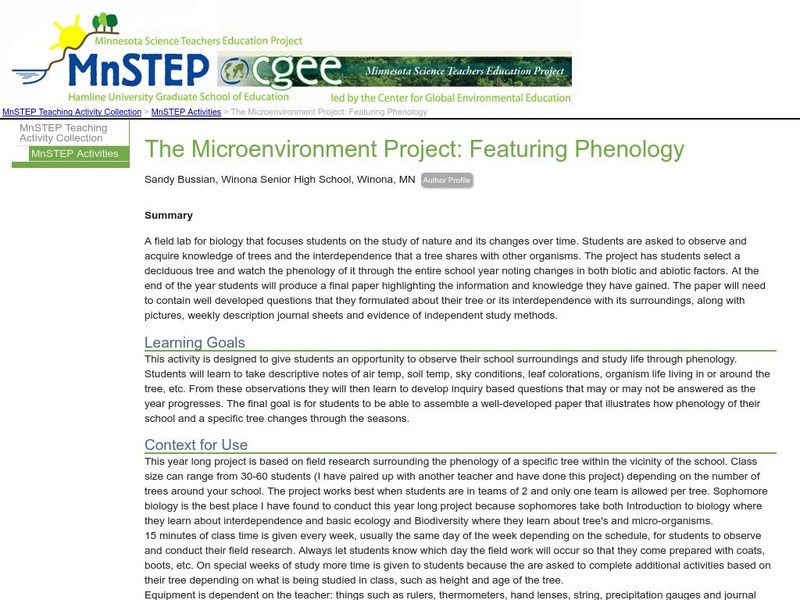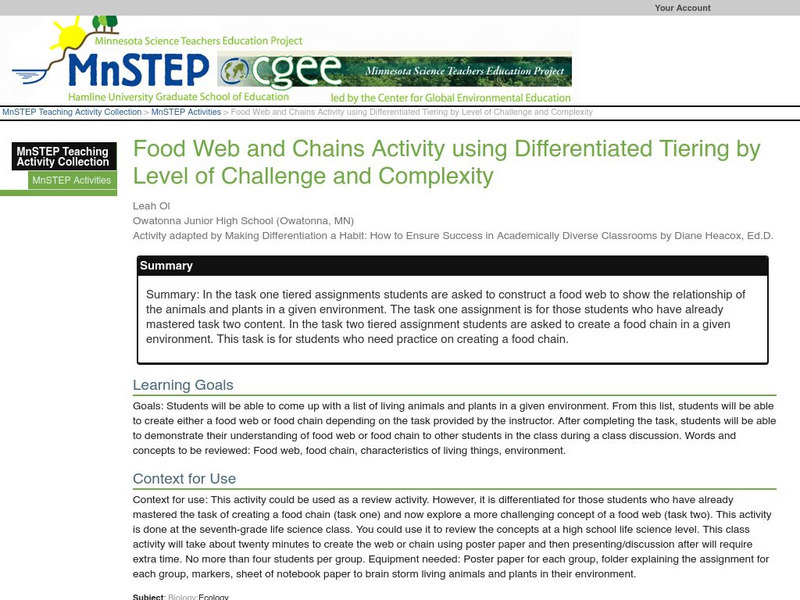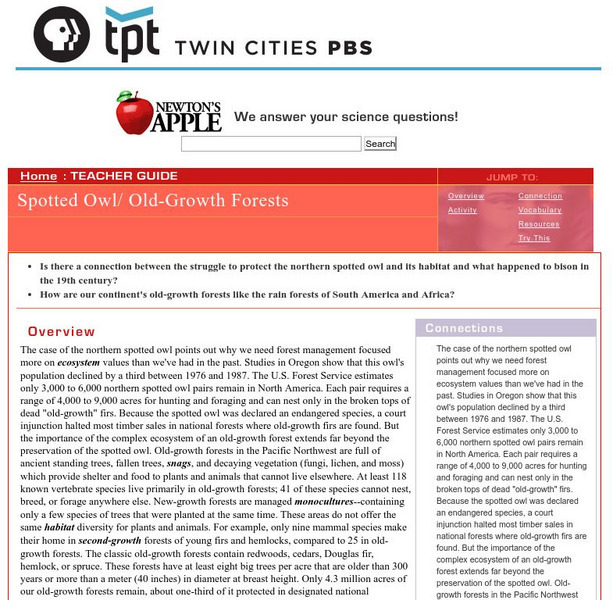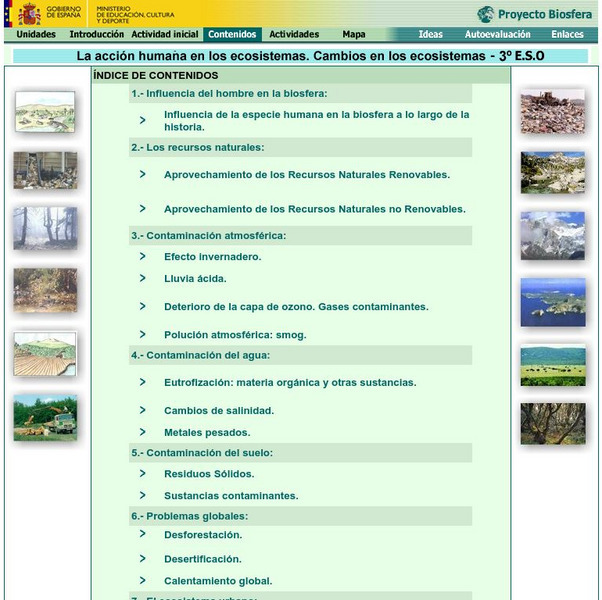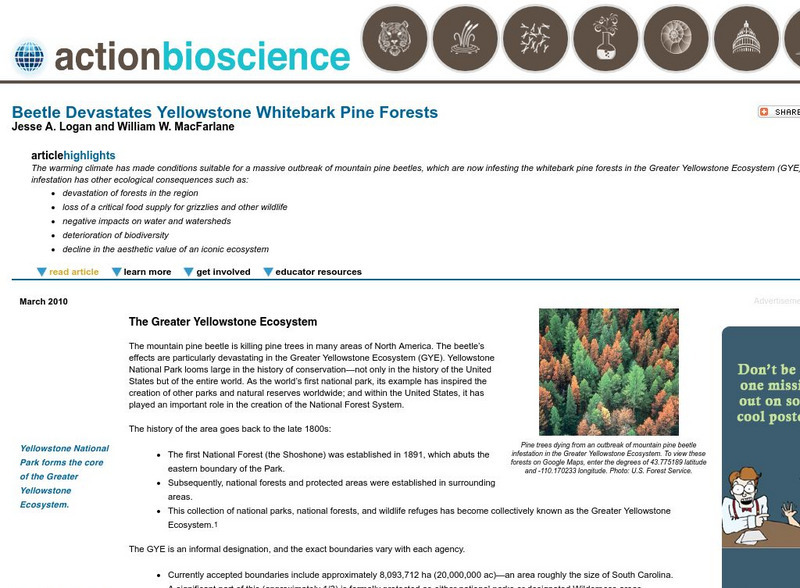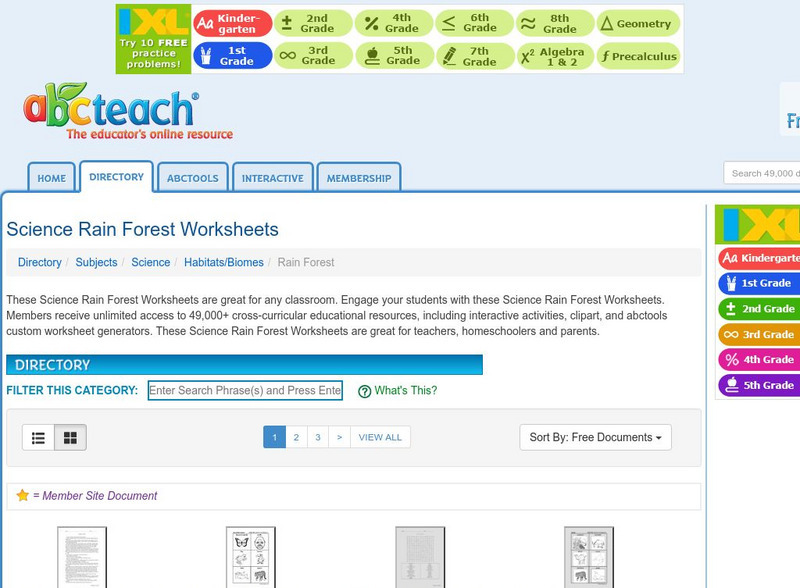McGraw Hill
Mc Graw Hill: Conservation Biology Pretest
Take this five question pretest over the topic of conservation biology, and then review the concepts after hitting submit.
E-learning for Kids
E Learning for Kids: Science: Mexico: What Is a Habitat?
Sofia came back from a trip around the world. She noticed how each animal she saw belonged to a certain habitat. Help her learn about animal habitats and the species that live there.
Scholastic
Scholastic: Endangered Ecosystems: Build a Food Web
Investigate some animals and see where they are in the food web. Build your own food web and relate it to the endangered species biomes.
Scholastic
Scholastic: Endangered Ecosystems: Build Your Own Caterpillar
As you build your own caterpillar, make sure it has everything it needs for its survival. Learn how characteristics, like color, spines, and glands, can help protect the caterpillar.
Sumanas
Sumanas Inc: Microbial Life: The Winogradsky Column
Nice animation of how to create a Winogradsky column using bacteria from pond mud. Learn how "mud can be mixed with several ingredients to provide food and other substrates for the bacteria to use" to survive.
Environmental Education for Kids
Eek!: Evergreens
Site chronicles Wisconsin's Evergreen and Conifer trees. There are descriptions of the various tree types. Additionally, site details the uses of these trees in nature. Ideal for grades 4-8.
Science Education Resource Center at Carleton College
Serc: Habitat Part 1
Students investigate creatures living under a rock and then present their findings on a class display and writing in a journal.
Science Education Resource Center at Carleton College
Serc: Investigating Biodiversity in Your Schoolyard
In this field lab, students will investigate the biodiversity around their school and record and document the information they find. The students will compare their information to those of their classmates, develop multiple hypotheses...
Science Education Resource Center at Carleton College
Serc: Geo Glitz: Intensive Geological Survey of the Land at a Specific Location
In this geology field lab, students investigate the surrounding land by walking different transects of the ecosystem, looking for and identifying as many different living and nonliving ecosystem features as possible
Science Education Resource Center at Carleton College
Serc: Energy Pyramids in Different Biome Locations
A research activity where students research the various biotic and abiotic factors that combine to make up a biome. The end product will be the creation of a PowerPoint presentation that identifies these factors and the creation of an...
Science Education Resource Center at Carleton College
Serc: Food Chains: Nature's Restaurant
Students begin this lesson by making observations and recording evidence of the variety of living things in local nature site. Students use reference materials to research predators and food of the animals they observed, then illustrate...
Science Education Resource Center at Carleton College
Serc: Environmental Interactions: Connectedness of a Natural System
A field experience where students undergo an exploration in a natural environment. They are introduced to the concepts of species, population, community, ecosystem, niche, and biosphere.
Science Education Resource Center at Carleton College
Serc: The Microenvironment Project: Featuring Phenology
A field lab for biology that focuses students on the study of nature and its changes over time. Students are asked to observe and acquire knowledge of trees and the interdependence that a tree shares with other organisms.
Science Education Resource Center at Carleton College
Serc: Using Plant Surveys to Study Biodiversity
An extended field investigation intended as launch into several concepts in environmental science including biodiversity, human impacts on natural systems, and energy transfer in ecosystems.
Science Education Resource Center at Carleton College
Serc: Differentiated Tiering Food Web and Chains Activity
Two differentiated tasks about food chains and webs. In the more challenging task, students construct a food web to show the relationship of the animals and plants in a given environment. In the lower level task, students create a food...
Science Education Resource Center at Carleton College
Serc: Epa's Environmental Education Center
A collection of fact sheets, brochures, and web pages about environmental issues. Topics include acid rain and air pollution, ecosystems, human health, waste and recycling, conservation, and water-related concepts and issues.
PBS
Newton's Apple: Spotted Owls and Old Growth Forests
This site from Newton's Apple, which is a production of KTCA Twin Cities Public Television, provides insights, vocabulary, resources and a main activity on the subject of why owls are threatened.
National Institute of Educational Technologies and Teacher Training (Spain)
Ministerio De Educacion: La Accion Humana en Los Ecosistemas.
Throughout this unit, you will see how man change and affects the environment in which they live. You will have a better understanding of our need of matter and energy and the consequences of their use and abuse. It contains 19...
National Institute of Educational Technologies and Teacher Training (Spain)
Ministerio De Educacion: La Transferencia De Energia en Los Ecosistemas
Learn about the transfer of energy in the ecosystem.
National Institute of Educational Technologies and Teacher Training (Spain)
Ministerio De Educacion: La Dinamica De Los Ecosistemas
This unit shows how ecosystems change over time and how matter and energy, which are essential to its operation, are transformed and passed from one living thing to another forming, in some cases, authentic cycles. It contains 19...
American Institute of Biological Sciences
Action Bioscience: Speciation and Biodiversity
As many species are going extinct due to healthy habitats being destroyed humans are depleting the world of its natural resources. Understand the repercussions of environmental destruction on species and biodiversity through this interview.
American Institute of Biological Sciences
Action Bioscience: Environmental Impacts of Marine Exotics
Invasive species are disrupting many bodies of water in North America. Scientists share their reasons for concern in this brief article. Supporting and educator resources are provided.
American Institute of Biological Sciences
Action Bioscience: Beetle Devastates Yellowstone White Bark Pine Forests
This article highlights the infestation of mountain pine beetles in Yellowstone White Bark Pine Forests. Find out the cause and effect of such an outbreak and explore supporting resources.
abcteach
Abcteach: Rain Forest
[Free Registration/Login Required] This site provides numerous links to facts, photos, information and activities all dealing with the rain forest. Teachers will find these links helpful in planning activities and lesson plans on the...








